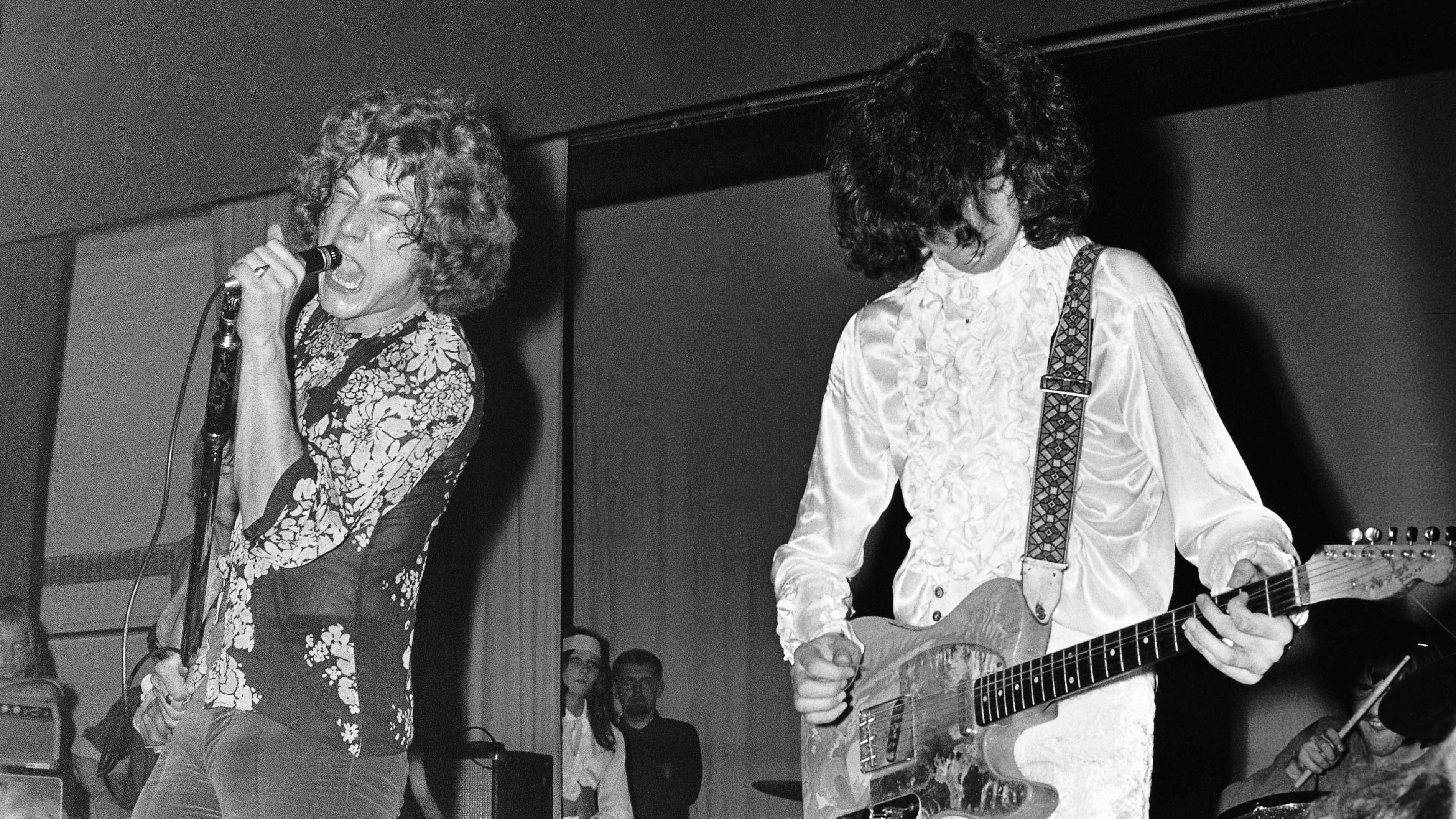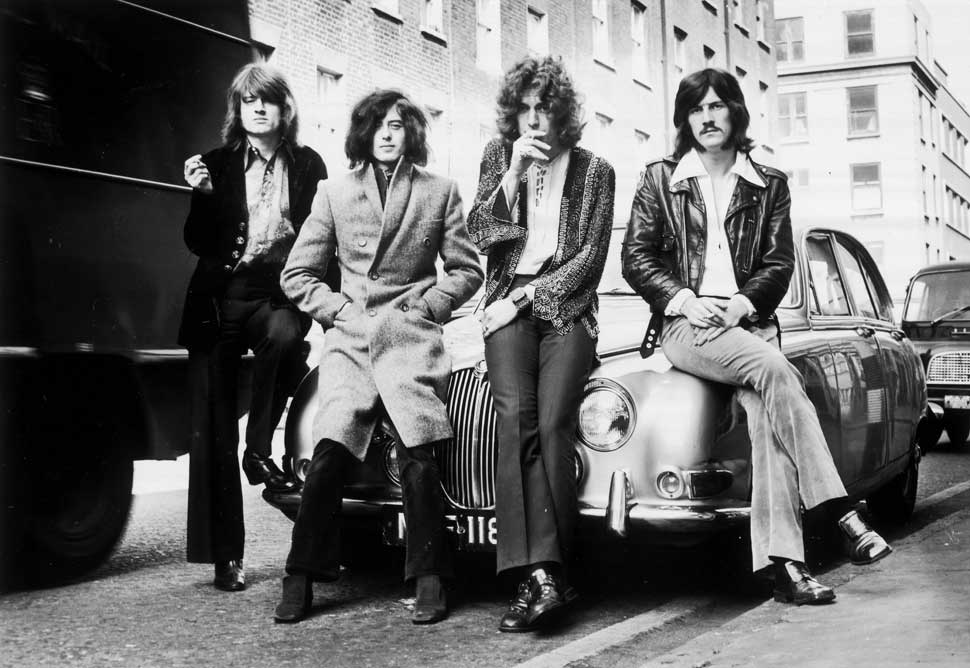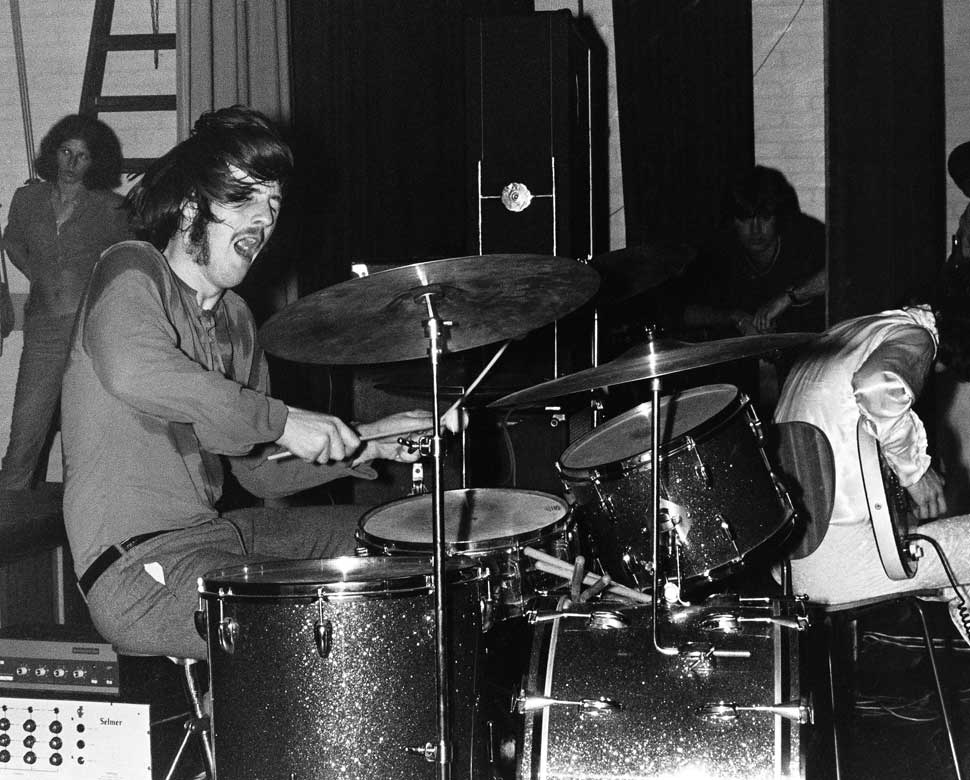
The announcement of a Yardbirds gig at Newcastle’s Mayfair Ballroom on October 4, 1968 barely caused a ripple of interest in the North East, let alone elsewhere. After a string of Top 10 hits a few years earlier, their career was on a downward slide and they were perilously close to becoming yesterday’s men.
What the people of Tyneside didn’t know was that the band had actually split up a few months earlier. But rather than cancel a Scandinavian tour, guitarist Jimmy Page had taken the opportunity to relaunch the band with singer Robert Plant, drummer John Bonham, and noted session player John Paul Jones on bass and keyboards.
And so the few dozen people who turned up at the Mayfair for what was supposed to be the first date of The Yardbirds’ UK tour were in for a surprise. After sitting through support bands Downtown Faction, the Junco Partners and New York Public Library [the latter a late replacement for Terry Reid], the audience found themselves confronted with an unfamiliar group. Although they didn’t know it, they were witnessing the first British gig by the band that would become Led Zeppelin.

Jimmy Page: We originally thought that by calling ourselves the New Yardbirds we would be able to keep a sort of continuity from the early days of the old group.
Brian Greenaway [Mayfair manager, 1966-71]: It all exploded in the 1960s. Friday night we’d often get 2,500 people in. It would be heaving. We had some really big names on, people like The Who.
Fraser Suffield [promoter]: I promoted a lot of shows in the 60s and early 70s at the Mayfair. I booked the Yardbirds gig in early 1968 via the Sherry-Copeland Agency. The tickets were 10/6 [about 52p] to get in. I’ll have probably paid around £75 or £100 for the band.
Bob Sargeant [keyboard player, the Junco Partners]: For these Mayfair gigs there would usually be a national band, an up-and-coming national band and two local supports. The Juncos followed Downtown Faction, New York Public Library followed us and the New Yardbirds followed them. Terry Reid was on some of the adverts, but he didn’t play.
Terry Reid: Fantasia and I were on Cream’s farewell US tour and couldn’t do the gig. We had a lot of juggling around with dates about then.
Tez Stokes [guitarist, New York Public Library]: We got the gig the week before the show. We only found out we were supporting The Yardbirds when we got there.
Ray Laidlaw [drummer, Downtown Faction]: Downtown Faction were a progressive blues band, and the Five Live Yardbirds album had been a huge influence on us. The Yardbirds had changed a lot since then but, I was still mildly interested to see them.

Fraser Suffield: I hadn’t met The Yardbirds before, so when they arrived I introduced myself. I didn’t think: “This isn’t the band I booked”.
Tez Stokes: We’d met Jimmy Page years before, when he was in Neil Christian’s Crusaders. He was a very well-respected guitar player, but very quiet, reserved and shy. John Paul Jones I met when he was the bass player with the Tony Meehan Band. He stayed with us that night, because he had a meeting the next morning with [producer] Mickie Most
Charlie Foskett [audience member]: The day before, I’d taken my Ampeg upright bass into Barrett’s music shop in the centre of Newcastle, to see if they’d be interested in buying it. It was like a stick with a point on one end and machine heads on the other. While I was there, in walks John Paul Jones. I didn’t know who he was, but the shop guys are going: “That’s him!” That’s him who?”.
They knew him from his session work and that he’d be playing the Mayfair the following day. He had a go with my bass, and starts playing the bass line to Whole Lotta Love, although of course none of us knew it then. It sounded total rubbish on an upright bass. The strings were a couple of inches off the fretboard, making it really difficult to play. I told him it sounded great. It didn’t at all, but I wanted to flog it. He gave me £14 and left the shop with it under his arm.
Charlie Harcourt [guitarist, the Junco Partners]: Before the gig, either the band or their roadie asked if they could borrow our organ. They didn’t seem very well prepared. We told them no, they should have brought their own.
Bob Sargeant: I don’t remember John Paul Jones playing keyboards that night. That’ll be the reason why. I must have been in the bar when they asked, because I’d have said yes.
Fraser Suffield: Some bands had rider requirements as long as your arm. The New Yardbirds weren’t one of them.
Ray Laidlaw: This was in the days before riders really came in. If you were lucky you might get a crate of beer. All four bands were in the same dressing room, which was a large, disused bar at the side of the stage. We were all milling around, coming and going.
Bob Sargeant: I’ve got a vague memory of talking to Jimmy at the bar before they went on. He was the only one I spoke to.
Charlie Harcourt: The Mayfair had a revolving stage, so one band would be setting up at the back while the other was performing. When that band finished their set, the stage would turn and the other band would arrive.
Ray Laidlaw: The revolving stage meant you couldn’t put your gear on stage until just before you were about to go on. There wasn’t room. The corridors backstage were full of gear.
Charlie Foskett: There wasn’t much of a feeling of anticipation before the New Yardbirds went on, although it was crowded around the stage.
Ray Laidlaw: I don’t recall the gig being that well attended. The Yardbirds were old news by that point . The Mayfair was a bit like a club, and some people would go no matter who was on.
Tez Stokes: I stood right at the front and watched. There was hardly anyone there. Some people were sitting in the balcony, looking down.
Bob Sargeant: The bands were expected to be playing when the revolving stage came round. It was usually a 12-bar or something, before they started their set.
Charlie Foskett: Zeppelin weren’t playing when the stage came round, they were farting around. Jones was on the left side in front of a silver-fronted Fender Bassman amp. He hit a note and the cloth on the front of the amp wobbled, which I thought was cool. Page posed about with his Les Paul. They weren’t using monitors, all of that came later. the riser, which had the amps, waiting for someone to go: “One, two, three, four”. That came pretty quickly.
Bob Sargeant: They were good. Very indicative of what they’d become as Led Zeppelin. I can remember thinking: “Who’s that bloke singing?”.
Charlie Foskett: A lot of the audience went: “Where’s The Yardbirds? Who’s this?”. It wasn’t The Yardbirds, it was another band.
Fraser Suffield: When the band got into it, I thought they were very impressive, with lots of promise.
Charlie Foskett: After five minutes it was: “This is great!”. Everybody had forgotten about The Yardbirds. Nobody knew the name Led Zeppelin then, of course, so it was: “Yeah, this is the New Yardbirds!”.
Ray Laidlaw: Because they’d only been playing together for a few weeks, they didn’t have a presence. When you see a band with feel or atmosphere to them, you come away thinking you’ve really seen something. I didn’t get that with them, because at the time they didn’t have it. There was no chemistry.
Charlie Foskett: I thought the band were terrific. The first thing was the energy. Everything was a bunch of riffs. Page’s guitar was ripping away. I’ve heard better soloists, but he was a great showman, a walking skeleton with skin-tight bell-bottom jeans, the hair and tons of posing.
Ray Laidlaw: I wasn’t very impressed with Robert Plant. He was a bit fey. I was more interested in the mechanics of the band. Bonham was pretty damn good. John Paul Jones kept himself in the background, and Jimmy Page was a fantastic player. But the band wasn’t finely tuned.
Bob Sargeant: I thought the material they did was similar to what was on Jeff Beck’s Truth album.
Ray Laidlaw: Page was basing it on the Jeff Beck Group. He knew how successful they’d been in the US, and was using that as his model. I wouldn’t be surprised if after each gig he’d go through it with the band: a little more of this, a bit less of that, polish that, drop this number, bring that one in. Like managing a football team.
Bob Sargeant: There was a track on Truth called You Shook Me, with Rod Stewart singing.The New Yardbirdsdid that number at the Mayfair.They also did Shapes Of Things, the old Yardbirds hit. And they played Communication Breakdown, and a couple of other songs that turned up on the first Zeppelin album.
Charlie Foskett: I was very much into their overall noise and energy along with the visual thing. They really had their chops together. It was as loud as the gear would allow it to be at that point, and full throttle, including the couple of Yardbirds hits they did. The discerning music lovers were glued to it.
Tez Stokes: Jimmy Page did an extended guitar solo sitting down. The sweat was pouring out of him. As a guitarist myself I was watching very closely, picking up tips. I was very impressed.
Ray Laidlaw: I was thinking that this was the latest version of The Yardbirds, and some of it was really good and some of it wasn’t. I didn’t go away telling people that The Yardbirds are back and they’re fantastic. It was all part of the progressive blues thing that was happening then, where maybe they’d make a couple of albums and that would be it. To me they didn’t warrant any more credence than any of the many other John Mayall-influenced bands that were knocking about.
John Porteous [Tyneside record dealer]: My friend, the late John Gourley, was Newcastle’s top Yardbirds collector. He goes to the Mayfair that Friday night expecting to see the Keith Relf line-up. The band comes on, and he watches three or four numbers. He then goes to the front desk, says the band on stage aren’t The Yardbirds, demands his money back and leaves. Quite a few others did the same.

Fraser Suffield: I didn’t receive any complaints from the Mayfair manager about people wanting their money back. When people were leaving I got no adverse comments about them not being the band they were expecting.
Charlie Foskett: After the last song, it was a case of: “Thank you and goodnight!”. The stage revolved and they were off. I did think they had it, and that it could happen for them, given half a chance.
Fraser Suffield: After the gig I went backstage to pay the money to the band themselves. They didn’t have a manager with them.
Brian Greenaway: Once a band had been paid they’d be away. They tended not to stay overnight. They’d be in the van and back to London.
Jimmy Page: We realised we were working under false pretences. The thing had quickly gone beyond where The Yardbirds left off. We all agreed there was no point in retaining the ‘New Yardbirds’ tag, so when we decided to change the band’s name.
Ray Laidlaw: It only dawned on me three or four months later that Led Zeppelin were the people I’d seen. If they had to stand or fall by the performance that night they probably wouldn’t have been signed. It was okay, but not the entity with the mighty presence that Zeppelin became very soon after
What happened next?
After several more gigs, Page renamed the band Led Zeppelin. UK university and club dates were followed by a US tour and the release of their eponymous debut album. Downtown Faction evolved into the band Lindisfarne. The Mayfair was demolished in 1999 to make room for a car park.







